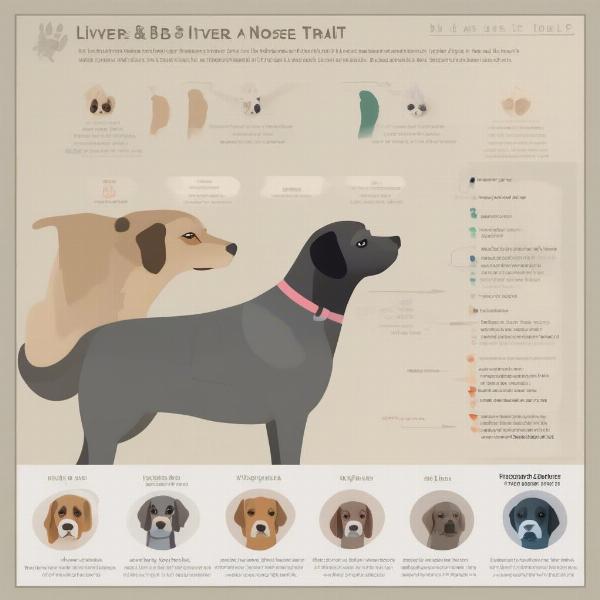The term “liver nose dog” refers to dogs with a brown nose, often accompanied by similarly colored eye rims, lips, and coat accents. This unique pigmentation isn’t breed-specific but a result of recessive genes diluting the typical black pigment, eumelanin, into a liver-colored variation. This article dives into the genetics behind the liver nose, addresses common misconceptions, and provides valuable insights into caring for these beautiful dogs.
The liver color, ranging from a rich reddish-brown to a lighter, almost pinkish hue, can appear in various breeds. While some breeds, like the Vizsla and Chesapeake Bay Retriever, are commonly associated with this trait, it can pop up unexpectedly in others. It’s important to understand that the liver nose itself doesn’t indicate any specific health concerns or behavioral traits.
The Genetics of the Liver Nose
The liver nose, also known as the Dudley nose, results from a recessive gene known as the “b” allele. For a dog to exhibit a liver nose, it must inherit two copies of this gene, one from each parent. If a dog inherits only one “b” allele and one dominant “B” allele (for black pigmentation), it will have a black nose but can still carry and pass on the liver nose gene to its offspring. Understanding this genetic mechanism is crucial for breeders interested in predicting and managing the liver nose trait in their litters.
 Genetic inheritance of liver nose in dogs
Genetic inheritance of liver nose in dogs
Debunking Liver Nose Myths
There are several misconceptions surrounding liver nose dogs. One common myth is that they are more prone to certain health problems. This is untrue. The liver nose is simply a cosmetic trait and doesn’t correlate with any specific health predisposition. Another misconception is that liver-nosed dogs have different temperaments. Again, this is not supported by scientific evidence. Temperament is shaped by a complex interplay of genetics, environment, and training, not nose color.
Caring for Your Liver Nose Dog
Caring for a liver-nosed dog is no different than caring for any other dog. They require the same essential care: a balanced diet, regular exercise, proper grooming, and routine veterinary checkups. However, dogs with lighter pigmentation, especially those with a pink or light liver nose, may be more susceptible to sunburn. It’s recommended to use pet-safe sunscreen on their nose and other exposed areas during prolonged sun exposure, particularly during peak sun hours.
Conclusion
The liver nose in dogs is a fascinating genetic trait that results in a unique and beautiful aesthetic. Understanding the genetics behind this trait and dispelling common misconceptions helps appreciate the diversity within dog breeds. Whether your dog sports a black nose or a liver one, providing them with love, care, and a healthy lifestyle is what truly matters.
FAQ
- Does a liver nose indicate a purebred dog? No, the liver nose can occur in both purebred and mixed-breed dogs.
- Are liver nose dogs more sensitive to the cold? No, nose color doesn’t affect a dog’s sensitivity to temperature.
- Can two black-nosed dogs produce a liver-nosed puppy? Yes, if both parents carry the recessive “b” allele.
- Is the liver nose a sign of a genetic defect? No, it’s a natural variation in pigmentation.
- What breeds commonly have liver noses? Vizslas, Chesapeake Bay Retrievers, Weimaraners, and certain Spaniels often exhibit this trait.
- How can I protect my liver-nosed dog from sunburn? Use pet-safe sunscreen on exposed areas, especially during peak sun hours.
- Does the liver nose affect a dog’s sense of smell? No, the color of a dog’s nose does not affect their sense of smell.
About ILM Dog
ILM Dog is your trusted international resource for all things dog-related. We provide expert advice on dog breeds, health, training, nutrition, grooming, and much more. Whether you’re a seasoned dog owner or just starting your journey, our aim is to empower you with the knowledge and resources to provide the best possible care for your canine companion. From breed selection and healthcare to training tips and product reviews, ILM Dog offers comprehensive guidance to help you navigate every aspect of dog ownership. Contact us at [email protected] or +44 20-3965-8624 for any inquiries.